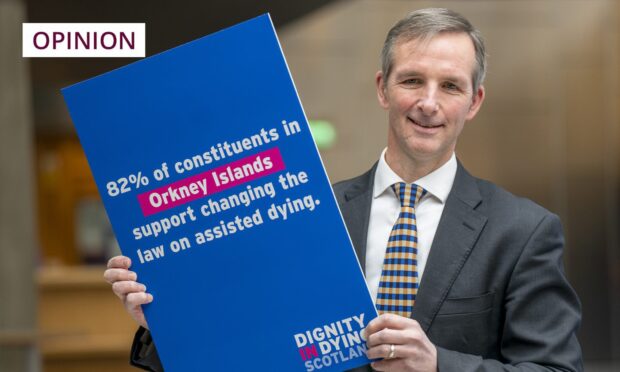You’d be forgiven for taking a deep breath and looking away as the Scottish Parliament announces it’s intention to legislate for assisted dying.
The Scottish Government has struggled in recent times with issues which require it to lead rather than follow public opinion.
From trans rights to the recent hate crime legislation, the SNP have found themselves pushing water uphill and finding many of their own people spilling over the sides as a consequence.
This bill on assisted dying though is very different in a number of critical ways.
First of all, it’s not a government bill, it’s a private members bill.
‘A more genial gentleman you’ll struggle to find’
A piece of legislation brought forward by an individual member of the Scottish Parliament. In this instance it’s Liam McArthur, the Liberal Democrat MSP for Orkney, who also serves as one of parliament’s Deputy Presiding Officers.
A more genial gentleman you’ll struggle to find. He is also a patient and very calm man driven by the value of fairness.
I used to serve on the Scottish Parliament’s Corporate Body with him and was regularly irritated by his determination to be rational and fair, to see all sides of an argument.
This is the parliament’s third attempt to legislate in this area in it’s 25 year history, and it is very likely to be third time lucky.
If this legislation passes, it will be down to two key factors.
The first of which is Liam himself, for patiently, calmly and rationally making his case and building support.
More on the second factor in a moment, but first, what will this bill actually do?
Officially entitled the Assisted Dying for Terminally Ill Adults (Scotland) Bill, it will allow an adult with an advanced terminal illness to lawfully be provided with assistance to end their own life.
In short it will give a power to those who need and want it to be in control of their own death.
Assisted dying details will be hotly debated
There are criteria and caveats, of course, and it’s these details which will rightly be hotly debated in the coming months.
As introduced though, it demands that people be over the age of 16. That they have suitable capacity to request an assisted death, that they do so voluntarily and have not been in anyway pressured or coerced.
They also have to have been resident in Scotland for at least 12 months and be registered with a Scottish GP.
Defining a terminal illness in law has been a matter of some debate in the past. This particularly legislation will define what an “advanced terminal illness” is as something which is a progressive disease or condition which an individual wont recover from and is reasonably expected to cause their premature death.
That is a pretty specific criteria which means it’s not an entitlement that anyone with any illness can draw down on, or indeed a disability whether that be mental or physical.
Once a declaration has been made by someone meeting this criteria that they wish their life to end, two separate doctors must assess the individual for both their clinical condition and their mental competence.
Only once those two doctors are equally content that the criteria has been met will the individual be able to make a second declaration requesting assistance to end their life, with a minimum of 14 days between these two requests.
Once all conditions have been satisfied, the medical practitioner can then provide the terminally ill adult with the approved substance to take their own life.
Much of this detail should and will be tested to destruction by the scrutiny processes within the Scottish Parliament’s. Aided by the fact that this will largely be a free vote for each individual MSP to make free of party whipping.
The final proposal may well be different from the one that is introduced this week and that will be the product of a properly democratic process regardless of the form it takes.
Crucially though, what marks this proposal out as very different from the big set piece examples of “progressive” legislation we’ve seen in recent times is that that we the people in are in favour of it.
“Many have been wondering what took the political classes so long”
Overwhelmingly in fact. If anything, they’ve been wondering what took the political classes so long.
Three quarters of us believe in this Bill, perhaps because many of us have seen someone close to us die in extraordinary pain or discomfort, or indeed watched someone’s life be prolonged by a technology which gave them time without qualifying the quality of it.
I’ve always thought that if you believe that we should all have autonomy over our own bodies that should apply as much in death as it does in life.
This bill has the potential to do just that, to give people control and the chance of a good death. Defining that as something they have a say in.
It could prove yet to be our parliament’s finest hour. Thank you Liam.













Conversation